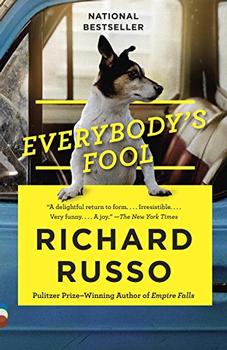Summary | Excerpt | Reading Guide | Reviews | Beyond the Book | Readalikes | Genres & Themes | Author Bio

Critics' Opinion:
Readers' Opinion:
First Published:
May 2016, 496 pages
Paperback:
Jan 2017, 528 pages
 Book Reviewed by:
Book Reviewed by:
Sarah Tomp
Buy This Book
Triangle
Hilldale cemetery in North Bath was cleaved right down the middle, its Hill and Dale sections divided by a two-lane macadam road, originally a colonial cart path. Death was not a thing unknown to the town's first hearty residents, but they seemed to have badly misjudged how much of it there'd be, how much ground would be needed to accommodate those lost to harsh winters, violent encounters with savages and all manner of illness. Or was it life, their own fecundity, they'd miscalculated? Ironically, it amounted to the same thing. The plot of land set aside on the outskirts of town became crowded, then overcrowded, then chock-full, until finally the dead broke containment, spilling across the now-paved road onto the barren flats and reaching as far as the new highway spur that led to the interstate. Where they'd head next was anybody's guess.
Though blighted by Dutch elm disease in the '70s and more recently by a mold that attacked tree roots, causing them to weaken and constrict and allowing the ground, without warning, to collapse in pits, the original Hill section was still lovely, its mature plantings offering visitors shade and cool breezes. The gentle, rolling terrain and meandering gravel pathways felt natural and comfortable, even giving the impression that those resting beneath its picturesque hummocks—some interred before the Revolutionary War—had come there by choice rather than necessity. They seemed not so much deceased as peacefully drowsing beneath tilting headstones that resembled weathered comfy hats worn at rakish angles. Given the choice of waking into a world even more full of travail than the version they left, who could blame them for punching the snooze button and returning to their slumbers for another quarter century or so?
By contrast, the newer Dale was as flat as a Formica tabletop and every bit as aesthetically pleasing. Its paved pathways were laid out on a grid, the more contemporary grave sites baked and raw looking, its lawn, especially the stretch nearest the highway, a quilt of sickly yellows and fecal browns. The adjacent acreage, where the Ultimate Escape Fun Park had once been pictured, was boggy and foul. Lately, during periods of prolonged rain, its pestilential groundwater tunneled under the road, loosening the soil and tugging downhill the caskets of those most recently interred. After a good nor'easter there was no guarantee that the grave site you visited featured the same casket as the week before. To many the whole thing defied logic. With all that seeping water, the Dale should have been richly verdant, whereas everything planted there shriveled and died, as if in sympathy with its permanent, if shifty, inhabitants. There had to be contamination involved, people said. All those putrid acres had been used as an unofficial dump for as long as anybody could remember, which was why they'd been purchased so cheaply by the fun park's planners. Recently, during a prolonged drought, dozens of leaking metal drums decorated with skulls and crossbones had surfaced. Some were old and rusty, leaking God-only-knew-what; other newcomers were labeled "chrome," which cast a pall of suspicion on neighboring Mohawk, a town once rich in tanneries, but these accusations were emphatically and for the most part convincingly denied. Anybody wanting to know what those tanneries did with their dyes and carcinogenic chemicals only had to visit the local landfill, the stream that ran through town or the hospital's oncology ward. Still, didn't the drums of toxic slurry have to come from somewhere? Downstate most likely. On this point the history of New York was unambiguous. Shit—both liquid and solid, literal and metaphorical—ran uphill in defiance of physics, often into the Catskills, at times all the way to the Adirondacks.
Excerpted from Everybody's Fool by Richard Russo. Copyright © 2016 by Richard Russo. All rights reserved. No part of this excerpt may be reproduced or reprinted without permission in writing from the publisher.




Great literature cannot grow from a neglected or impoverished soil...
Click Here to find out who said this, as well as discovering other famous literary quotes!
Your guide toexceptional books
BookBrowse seeks out and recommends the best in contemporary fiction and nonfiction—books that not only engage and entertain but also deepen our understanding of ourselves and the world around us.